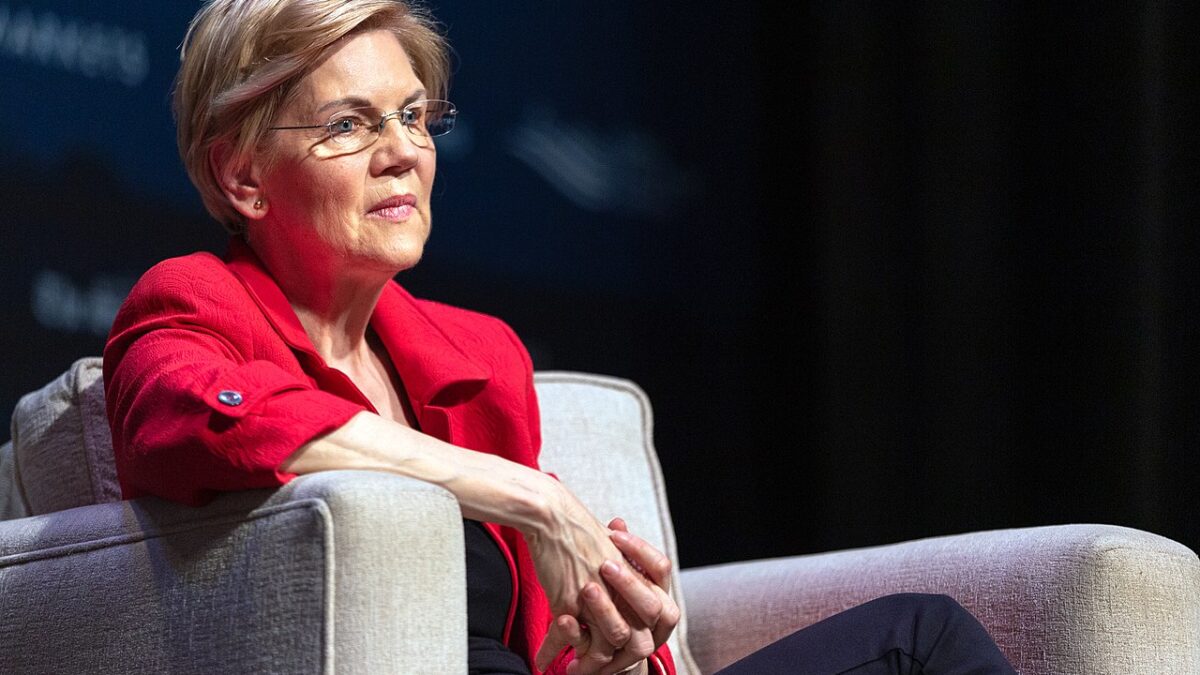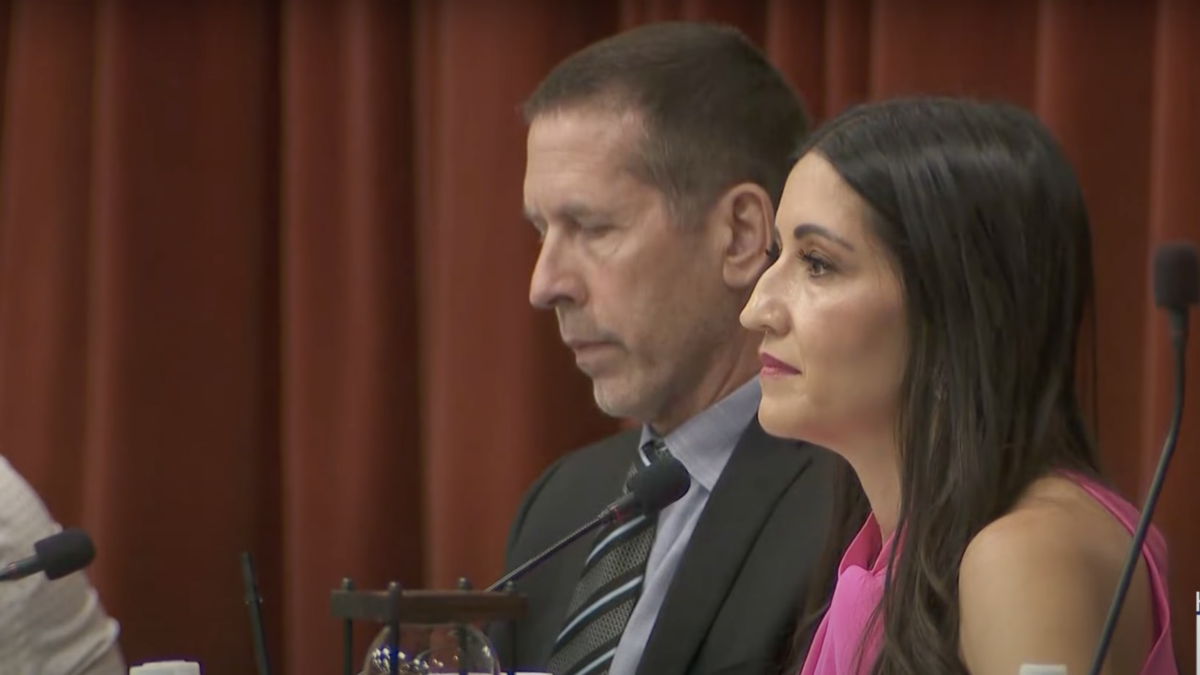Last week, the White House’s efforts to promote private censorship of speech continued with Press Secretary Jen Psaki urging Spotify to do more to respond to podcast host Joe Rogan’s Covid-19 “misinformation.” After calling Spotify’s decision to add a new warning label to his Covid-19 episodes “a positive step,” Psaki stressed “there’s more that can be done,” a not-so-subtle call to censor Rogan and other speech that conflicts with the government’s messages.
Since Covid escaped China more than two years ago, governmental officials’ widespread encouragement of silencing speech they disagree with reached levels never before seen in the history of our republic. While the exponential growth in government officials cheering censorship is disconcerting—and dangerous—it is generally not unconstitutional.
But in a little-noticed case percolating in a federal court on the west coast against Sen. Elizabeth Warren, we see the exception: a violation of the First Amendment by a sitting U.S. senator. That case, Kennedy v. Warren, offers the best chance for courts to check government officials and remind our elected leaders that they cannot issue veiled threats to punish those offering a platform for protected speech.
Yet that is precisely what the Massachusetts senator did to squelch the success of a book entitled “The Truth About COVID-19: Exposing The Great Reset, Lockdowns, Vaccine Passports, and the New Normal,” published by Chelsea Green on May 16, 2021. A best seller according to both the Wall Street Journal and USA Today, the book, authored by Dr. Joseph Mercola and Ronald Cummins, condemned government Covid policies such as lockdowns and vaccine mandates. The book also presented facts conflicting with many claims made by our government, citing scientific studies and credible new sources in support of the various assertions.
Warren Uses Her Position to Push Censorship
On September 7, 2021, Warren dispatched a letter to Amazon in which she claimed that certain books sold by the internet giant contained “COVID-19 misinformation.” In her letter, Warren singled out “The Truth About COVID-19”as the most blatant example of “disinformation” about vaccines and treatments being “peddled” by Amazon, even including a screenshot of the book as shown on Amazon’s webpage.
The next day, the Massachusetts senator issued a press release, publicizing her letter to Amazon and posting a link to a copy of that letter on her government website. “Senator Warren is calling on Amazon to take aggressive action to stamp out COVID-19 misinformation,” the press release read.
After Warren issued her press release, national media widely publicized her letter, causing publisher Chelsea Green to immediately fear this would cause booksellers to stop stocking or promoting “The Truth About COVID-19.” Those concerns proved valid. On September 10, 2021, Barnes and Noble informed Chelsea Green via email that it would stop offering “The Truth About COVID-19” as an e-book. Barnes and Noble’s brick-and-mortar stores and most independent booksellers are also refusing to carry the book.
Additionally, while Amazon continues to sell the book, the online giant notified Chelsea Green it would not run ads promoting, or simply including, “The Truth About COVID-19.” Amazon also removed the book from the “medical work” category, where it had previously been listed. Amazon also stopped advertising “The Truth About COVID-19”to users whose purchase history would indicate an interest in the text.
The Publisher and Authors Sue
On November 7, Chelsea Green, authors Mercola and Cummins, and Robert F. Kennedy, Jr., who wrote the introduction to the book, filed suit in a federal court in Washington state against Warren in both her official and personal capacities. (While none of the parties resides in Washington state, the complaint alleged that venue was proper because Warren sent the “violative letter” to Amazon, which is headquartered there.)
Margo Baldwin of Chelsea Green explained to The Federalist why they filed their lawsuit: “Protecting the First Amendment is fundamental to a free society,” yet “politicians are now picking sides, rather than engaging in debate, and they prefer suppression to accessibility of information they disagree with.”
This should not be a partisan issue, Baldwin stressed, with history teaching how dangerous such suppression of free speech is. That is “why the First Amendment must prevail and preserve our right to publish books – especially those that present opposing arguments to our politicians,” she told The Federalist.
It was based solely on the First Amendment that Chelsea Green and the other plaintiffs sued, with their concise 18-page complaint alleging that Warren violated their First Amendment right to freedom of speech and seeking as remedies an order declaring her conduct unlawful and unconstitutional and requiring Warren to issue a public retraction of the letter. The plaintiffs also sought monetary damages for Warren’s alleged violation of their constitutional rights.
Citing a 1962 Supreme Court Decision
A little over a month later, on December 9, 2021, the plaintiffs filed a motion for a preliminary injunction. That motion, like the plaintiffs’ complaint, argued that Warren’s letter violated the First Amendment, based on the Supreme Court’s 1962 decision in Bantam Books v. Sullivan.
Bantam Books involved a challenge to a commission established by the Rhode Island legislature, called the “Rhode Island Commission to Encourage Morality in Youth.” After the state legislature established the commission, it began sending notifications to distributors that certain books or magazines sold by the companies were “objectionable” publications. The commission further advised that it was its duty to recommend for prosecution “purveyors of obscenity.”
The Supreme Court in Bantam Books held that the state commission’s practice of sending threatening letters created an unconstitutional “system of informal censorship.” Further, even though the commission lacked any statutory enforcement power, the high court held “that the commission deliberately set about to achieve the suppression of publications deemed ‘objectionable’ and succeeded in its aim.”
As the plaintiffs suing Warren explained in their brief, Bantam Books and its progeny establish that “a governmental threat pressuring ‘a third party’ to stop ‘publishing or otherwise disseminating the plaintiff’s message’ violates a plaintiff’s First Amendment rights.” The “vice” of the “veiled threat” of legal repercussions, the court in Bantam Books explained, is that the government effects an unconstitutional “prior restraint” of speech indirectly that it could not achieve directly. And First Amendment jurisprudence teaches that threatening penalties for future speech, called a prior restraint, constitutes a quintessential First Amendment violation.
Government Expression Versus Intimidation
However, not every request for private censorship of speech violates the First Amendment. Rather, case law distinguishes between “government expression,” which is permitted by the First Amendment, and “government intimidation,” which is forbidden.
“Government expression” falls within what is known as the “government speech doctrine.” This doctrine provides that when the government is the speaker, it “is entitled to say what it wishes and to select the views that it wants to express,” including by favoring or disfavoring different views. And protected “government speech” includes the press secretary expressing the viewpoint that Spotify and other tech platforms should “do more” to stop the flow of so-called “misinformation.”
But while “government speech” or “government expression” is permissible, “government intimidation” is verboten. As one federal appellate court explained, “what matters is the distinction between attempts to convince and attempts to coerce,” and “a public-official defendant who threatens to employ coercive state power to stifle protected speech violates a plaintiff’s First Amendment rights.”
Warren’s letter easily qualifies as the latter, a threat to Amazon. Also, by republishing the letter publicly to other book sellers, it qualifies as a threat to unleash the massive power of the federal government against businesses unless they “stifle” sales of “The Truth About COVID-19.”
The Massachusetts senator’s letter opens by stating her “concerns” that Amazon is “peddling misinformation about COVID-19,” and noting “this is the second time in six months that I have identified Amazon practices that mislead consumers about COVID-19 prevention or treatment.”
Significantly, Warren ends the first paragraph by stating: “This pattern and practice of misbehavior suggests that Amazon is either unwilling or unable to modify its business practices to prevent the spread of falsehoods or the sale of inappropriate products—an unethical, unacceptable, and potentially unlawful course of action from one of the nation’s largest retailers” (emphasis added).
In her letter, Warren reiterates the “potentially unlawful” point by stating that Mercola, one of the authors of “The Truth About COVID-19,” “has posted over 600 articles on Facebook casting doubt on COVID-19 vaccines and been subject to multiple federal investigations (with one false-advertising investigation leading to a $2.95 million consumer settlement).”
From Speech to Intimidation
Given that Section 5(a) of the Federal Trade Commission Act prohibits “unfair or deceptive acts or practices in or affecting commerce,” including in advertisements, Warren’s letter presented a clear threat to Amazon and other sellers to comply with her demands, either by altering its algorithms or by removing the book, or risk “legal repercussions.” In fact, Warren goes so far in her letter as to suggest those selling “The Truth About COVID-19”would be responsible for the death of individuals who buy this “misinformation.”
Here, it is important to note that case law teaches that a government official’s threats cross the line from permissible government speech to prohibited government intimidation even if the official lacks “the direct regulatory or decision-making authority over the plaintiff.” Thus, that Warren is not a member of the Federal Trade Commission and lacks the authority to launch an FTC investigation or lawsuit is irrelevant.
Precedent also provides that a violation of the First Amendment occurs, and a party may sue over the threat, “even if it turns out to be empty—the victim ignores it, and the threatener folds his tent.” In short, precedent provides the Chelsea Green plaintiffs a solid First Amendment claim against Warren. That case law, properly applied, entitles them to a preliminary injunction against Warren in her “official capacity,” meaning in her role as “the federal government.”
Retract the Letter
While the plaintiffs also seek monetary damages against Warren, those claims are brought only against her in her “individual capacity.” In other words, the plaintiffs are suing Warren both as a “person” and as “the government.” And in their lawsuit against Warren as “the government,” the plaintiffs seek only “injunctive” relief, meaning a court order directing Warren to retract the letter and to cease issuing threats to sellers of “The Truth About COVID-19.”
Because the plaintiffs seek only injunctive relief in their suit against Warren in her “official capacity,” Warren’s attempt to hide behind “sovereign immunity” should fail. While “sovereign immunity” protects the government from liability for monetary damages (absent the government’s consent), Ninth Circuit precedent, which controls given that the case was filed in Washington state, holds that an injunction against federal officials “is not ‘against the sovereign’ if it alleges that the official acted in an unconstitutional manner.”
Likewise, Warren’s argument that the plaintiffs lack “standing” to sue, because the plaintiffs were not “injured” by the letter, should also fail. As the plaintiffs stress, it was Warren’s issuance of the threat that constituted a violation of their First Amendment rights—not the later private censorship. In any event, the plaintiffs also alleged numerous injuries, from Barnes and Noble pulling the book from its e-sales platform, to Amazon refusing to allow the plaintiffs to advertise the book. The Massachusetts senator also seeks refuge in the “Speech and Debate Clause” of the Constitution, which provides that “for any Speech or Debate in either House, they [members] shall not be questioned in any other Place.” This constitutional provision protects senators and representatives from civil liability for legislative activities.
However, case law distinguishes between “purely legislative activities protected by the Speech and Debate Clause,” and unprotected activities such as “‘news letters’ to constituents, news releases, and speeches delivered outside the Congress.” This precedent, properly applied, prevents Warren from avoiding liability based on the Speech and Debate Clause because her unlawful threats, first included in her letter, were later issued as a link to a press release. And those threats were designed to cause the censorship of “The Truth About COVID-19.”
Ripe for the Supreme Court
Whether the federal court in Washington State will properly apply this precedent remains to be seen, as well as how the Ninth Circuit Court of Appeals will view the case, as an appeal no matter which party prevails seems certain. Further, the facts of this case and the clear trend of the government to outsource censorship to big business and big tech make it ripe for review in the Supreme Court, especially since the high court has not addressed this issue since deciding Bantam Books some 60 years ago.
But even though the Chelsea Green plaintiffs have a strong case against Warren—and have stellar representation in their counsel, Nathan Arnold of Arnold and Jacobowitz—a win, even at the Supreme Court, will do little to counter the now-prevalent efforts of government officials to encourage the private censorship of speech: All Warren or the next elected official seeking to silence speech will need to do is reframe their threat as a request.
Public officials can easily draft censorship requests as “government speech,” designed to “convince” as opposed to coerce, private businesses to squelch viewpoints with which they disagree. When it is conservative speech, big tech and big business will happily comply.
So We Also Need a Free Economy
Without a private sector willing to check the government’s desire for censorship, the First Amendment will be toothless. So, this lawsuit against Warren, while justified and necessary, in the long run provides no protection for free speech. Rather, the answer will be creating a new private sector willing to stand up for free speech.
Those efforts are now underway, led by former Republican Rep. Devin Nunes, who ended his nearly 20 years of service in the House of Representatives to assume the CEO position at Trump Media and Technology Group, or “TMTG.”
“We’re trying to give everyone their voice back and open this Internet back up. And that’s why I left Congress, because it really was the most important issue at the highest level that has to be solved for good governance to come back to this country,” Nunes said in a recent interview with “American Thought Leaders” host Jan Jekielek.
Yesterday, Nunes reiterated that point, telling The Federalist that “the current attempts to squelch free speech are particularly dangerous because Big Tech has the means to do it, and the two key sectors that could help stop it—the political class and the media—are instead adamantly demanding even more censorship.”
There is no logical end point to this assault, Nunes added: “We can’t rely on big tech’s reasonableness or sense of fairness because they’re neither reasonable nor fair—they’re now a political enterprise dedicated to advancing the left’s agenda and silencing opposition to it.”
The only solution, Nunes notes, “is to create an alternative media ecosphere, such as Truth Social, that minimizes Big Tech’s ability to stifle dissenting views.” Sadly, Nunes is right.









